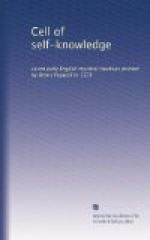“This onehead is verily made when the mights of the soul are reformed by grace to the dignity and the state of the first condition; that is, when the mind is firmly established, without changing and wandering, in God and ghostly things, and when the reason is cleared from all worldly and fleshly beholdings, and from all bodily imaginations, figures, and fantasies of creatures, and is illumined by grace to behold God and ghostly things, and when the will and the affection is purified and cleansed from all fleshly, kindly, and worldly love, and is inflamed with burning love of the Holy Ghost.”
But to this blessed condition none may attain perfectly here on earth. The writer goes on to speak of the mystical consolations and visitations granted to the loving soul in this life, distinguishing the feelings and sensations that are mere delusions, from those that truly proceed from the fire of love in the affection and the light of knowing in the reason, and are a very anticipation of that ineffable “onehead” in heaven.
The three remaining treatises—the Epistle of Prayer, the Epistle of Discretion in Stirrings of the Soul, and the Treatise of Discerning of Spirits[19]—are associated in the manuscripts with four other works: the Divine Cloud of Unknowing, the Epistle of Privy Counsel, a paraphrase of the Mystical Theology of Dionysius entitled Dionise Hid Divinity, and the similar translation or paraphrase of the Benjamin Minor of Richard of St. Victor already considered.[20] These seven treatises are all apparently by the same hand. The Divine Cloud of Unknowing has been credited to Walter Hilton, as likewise to William Exmew, or to Maurice Chauncy, Carthusians of the sixteenth century, whereas the manuscripts are at least a hundred years earlier than their time; but it seems safer to attribute the whole series to an unknown writer of the second part of the fourteenth century, who “marks a middle point between Rolle and Hilton."[21] The spiritual beauty of the three here reprinted—and, more particularly, of the Epistle of Prayer, with its glowing exposition of the doctrine of Pure Love—speaks for itself. They show us mysticism brought down, if I may say so, from the clouds for the practical guidance of the beginner along this difficult way. And, in the Epistle of Discretion, we find even a rare touch of humour; where the counsellor “conceives suspiciously” of his correspondent’s spiritual stirrings, lest “they should be conceived on the ape’s manner.” Like St. Catherine of Siena, though in a less degree, he has the gift of vision and the faculty of intuition combined with a homely common sense, and can illustrate his “simple meaning” with a smile.




